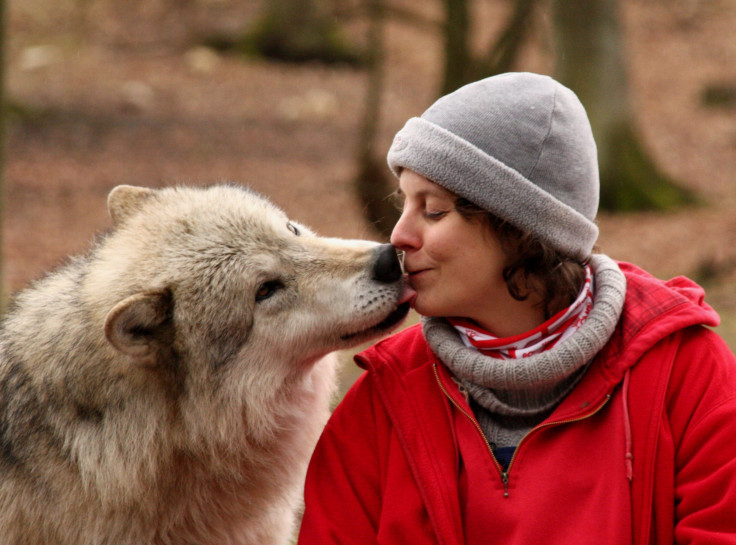From Wolf To Dog: Domestication May Have Been Aided By Wolf's Ability To Learn From Humans

Unless you’re one of the Stark kids from “Game of Thrones,” a wolf probably isn’t a great choice for a pet. But tens of thousands of years ago, wolves started down the path of domestication and ended up becoming “man’s best friend.” A new study suggests that ancient wolf tamers may have been assisted by the wolf’s existing ability to pick up on social cues from other animals.
Austrian researchers Friederike Range and Zsofia Viranyi from the University of Veterinary Medicine, Vienna were interested in seeing if human-raised wolves could follow human instructions on par with dogs. In experiments published on Tuesday in the journal Frontiers in Psychology, they ran 11 wolves and 14 dogs through a series of behavioral tests. The wolves were born in captivity, and both dogs and wolves were hand-raised by humans and had constant interactions with people.
In their experiments, the scientists used dead chicks as 'treats' for the animals. A ‘demonstrator" -- either a trained dog or a person -- showed the wolves and dogs where to look for hidden treats. Both wolves and dogs took cues from the demonstrator; they were two to four times more likely to find the treat after they saw a demonstrator hide it. If a human demonstrator only pretended to hide food (signaling with an empty hand that no treat would be given), both dogs and wolves tended to not waste time looking for a nonexistent treat.
“Overall, we found that wolves and dogs benefitted from a demonstration independent of whether a [dog] or human had provided the information,” the authors wrote.
One important difference, though, was that wolves were less interested in searching for food when dog demonstrators were used.
“It is possible that the wolves focused on different details of the demonstration than the dogs,” the authors speculated. “The demonstrator dogs did not like to take the dead chicks in their mouths and clearly showed their resistance by turning their head or trying to spit the chick out. In monkeys, it has been shown that at least one species is sensitive to a display of disgust, adjusting their behavior accordingly ... If wolves are similarly sensitive, they might have discarded the chicks as something inedible.”
If Paleolithic wolves already had the ability to learn from other species, that would have been a foundation for their early friendly interactions with ancient humans.
Arizona State University psychologist Clive Wynne has been working on cognition in dogs and wolves for years. He’s not exactly surprised by the find.
“Our congratulations to our friends in Austria that they have at last been able to rear some wolves that will respond to what people are doing,” Wynne wrote in an email.
Wynne pointed out that his former colleague Monique Udell, now a researcher at Oregon State University, demonstrated five years ago that hand-reared wolves can be just as successful as dogs in following human actions. Udell was the lead author on a 2008 paper in Animal Behavior showing that wolves, properly reared through daily interactions with humans, could even outperform dogs in following human cues in some instances.
“Of course, just testing wolves and dogs is not enough to permit wide-ranging conclusions about the origins of the sensitivity to people that we see in dogs,” Wynne wrote. “Quite likely other species would also show similar sensitivity if given the same opportunities in early life.”
Some of Wynne’s colleagues have already found some evidence that non-canine species can follow people’s instructions as well. In 2011, a study in the Journal of Comparative Psychology led by University of Florida researcher Nathan Hall found that bats could follow a person’s pointing gesture to a target that contained a hidden jar of nectar – but only if they grew up socialized to humans. Could there be a new future man’s best friend in the making, on wings?
SOURCE: Range, Friederike and Zsofia Viranyi. “Social learning from humans or conspecifics: differences and similarities between wolves and dogs.” Frontiers in Psychology published online 3 December 2013.
© Copyright IBTimes 2025. All rights reserved.





















